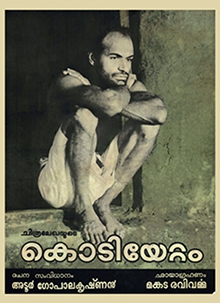This article has multiple issues. Please help improve it or discuss these issues on the talk page. (Learn how and when to remove these messages)
|
| Kodiyettam (Ascent) | |
|---|---|
 Poster | |
| Directed by | Adoor Gopalakrishnan |
| Written by | Adoor Gopalakrishnan |
| Produced by | Kulathoor Bhaskaran Nair |
| Starring | Bharath Gopi K. P. A. C. Lalitha |
| Cinematography | Mankada Ravi Varma |
| Edited by | M. Mani |
Production company | Chitralekha Film Society |
| Distributed by | Chitralekha Film Society |
Release date |
|
Running time | 128 minutes |
| Country | India |
| Language | Malayalam |
Kodiyettam is a Malayalam-language film written and directed by Adoor Gopalakrishnan. The film stars Bharat Gopy in the lead role. Notable smaller roles were played by K. P. A. C. Lalitha, Kuttyedathi Vilasini, Azeez and Adoor Bhawani. The film depicts the life of Shankaran Kutty, a carefree simpleton who eventually rises to be a mature, responsible adult. The title of the film translates to 'Ascent' which symbolizes the growth of Shankaran Kutty.[1]
The film was Bharat Gopy's second film, the first being Adoor Gopalakrishnan's Swayamvaram. The film is his first role as one of the main characters. The film notably does not feature any kind of background music and in the director's cut some scenes are missing. The film was produced by the Chitralekha Film Society, an organization cofounded by Gopalakrishnan himself. This was the second and last film produced by Gopalakrishnan under the banner.[2]
The film received widespread critical acclaim. It was one of the pioneering films of the new wave cinema movement in Malayalam cinema. The film won two National Film Awards. Bharat Gopy's portrayal of Shankaran Kutty won him the National Film Award for Best Actor and Adoor Gopalakrishnan won the National Award for Best Feature Film in Malayalam. Kodiyettam swept the Kerala State Film Awards of the year as well. It won Bharat Gopy his first Kerala State Film Award for Best Actor. Adoor Gopalakrishnan won the Best Film, Best Director and Best Story Awards and N. Sivan won the Best Art Director and The film is regarded a classic in psychology cinema.[3]
- ^ "Kodiyettam (1978)". www.malayalachalachithram.com. Archived from the original on 18 May 2022. Retrieved 22 July 2022.
- ^ "List of Malayalam Movies under the banner Chithralekha Films". www.malayalachalachithram.com. Archived from the original on 22 July 2022. Retrieved 22 July 2022.
- ^ "Kodiyettam (1977) featuring Bharat Gopy". Bharat Gopy. Archived from the original on 19 August 2022. Retrieved 22 July 2022.